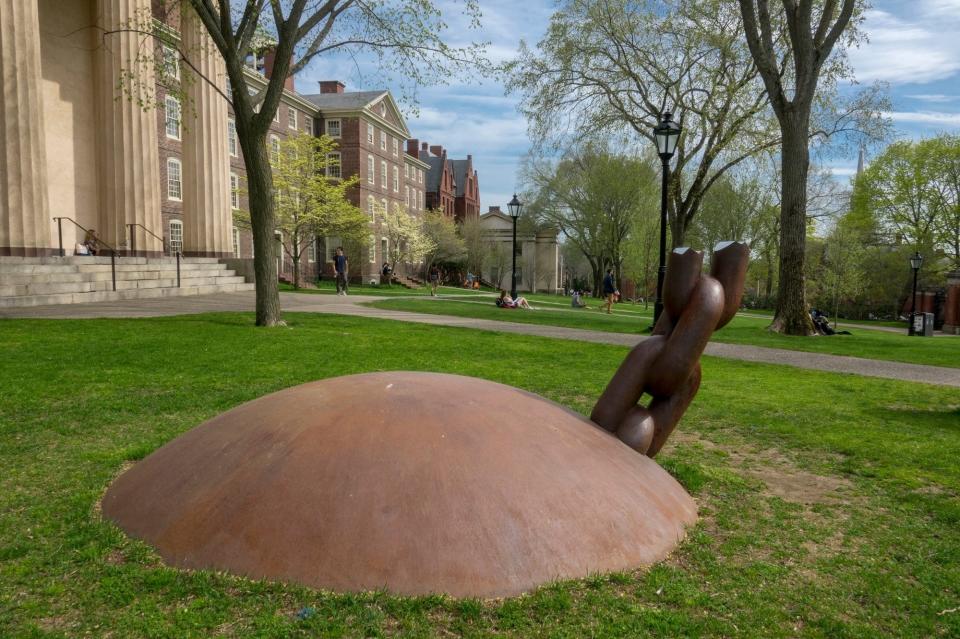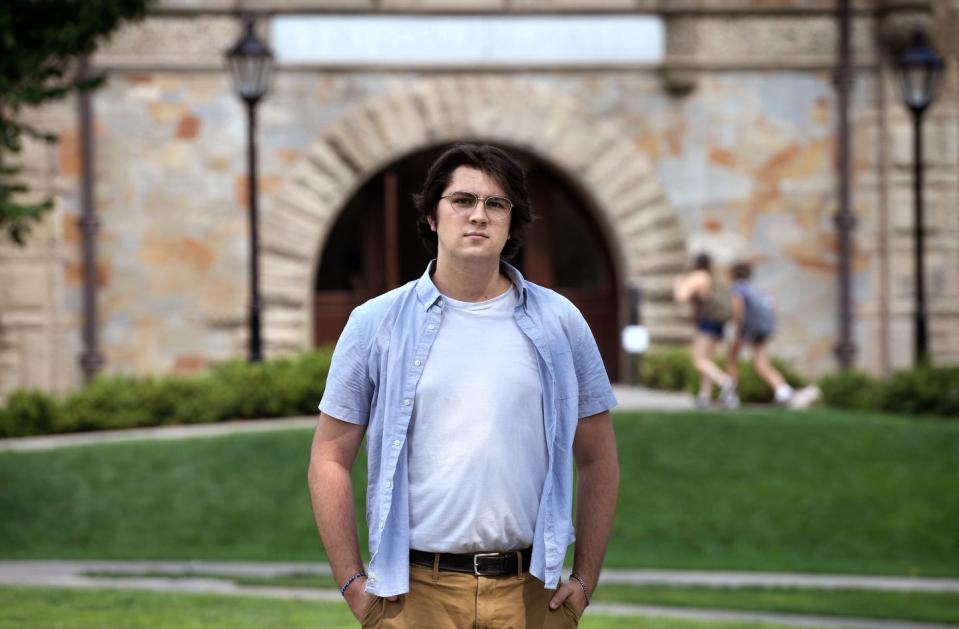These diverse students got to Brown during affirmative action. They worry about its future
When it came time to apply for college, Fabian Antunez-Lopez was scraping by.
He couldn't afford a college counselor. He couldn't pay application fees. But he wanted to go to an elite school. His his parents, who emigrated to the United States illegally from Mexico before becoming citizens, didn't know what Brown University was. They only saw Harvard in movies, and they knew of UCLA because of living in Los Angeles.
Antunez-Lopez relied on YouTube videos and the guidance of friends to get into Brown, becoming — as he put it — one of the only students of color in his San Fernando Valley high school to make it into an Ivy. Now, because of the U.S. Supreme Court decision to overturn affirmative action in college admissions, students like Antunez-Lopez seeking top colleges will lose a competitive edge they once had.
For the rising junior and head of La Alianza, Brown's Latino pre-law society, the setback is nothing new.
"As a part of the Hispanic community, we're used to hearing 'no,' we’re used to being denied access to these sorts of institutions, so it was kind of like, OK, this sucks, but it adds to our story, and it really does sort of give us another chip on our shoulder."

For some applicants, identity and race have weighed heavily in essays
Now, not only will Brown need to look for creative ways to continue admitting diverse students, but applicants themselves will need to find new opportunities to stand out.
Like Antunez-Lopez, rising junior June Dike wrote about her upbringing and her identity in her college essay for Brown. Being half African American and half Nigerian, Dike knew what it was like to be stuck between two worlds. In her essay, she recounted the pain of being excluded from her father's Nigerian church because that was only half of her heritage.
"I never felt fully integrated on either side of my ethnicity," Dike said, adding that "as a young child, that brought on a lot of identity issues."
More: Will Supreme Court ruling on affirmative action change admissions in Rhode Island?
Yet that personal struggle turned into an advantage in Dike's application and may have helped to catapult her into Brown.
According to the court's decision, schools can still take into account race as it connects to an applicant's personal experience — for example, an essay like Dike's that describes hardship related to identity — but schools can no longer consider race as a standalone factor in the admissions process.
"I do believe that Brown is going to have to get very creative with their diversity recruiting process. … What that looks like, I have no idea," Dike said.
Admissions process is 'going to be a guessing game'
Brown is still trying to figure out how to proceed in the face of the court's decision. Last month, the university said it would launch a legal review of the ruling, which would play out over the summer. So far, it has not hinted at what alternatives it may use to continue admitting diverse classes.
"With the ruling having upended decades of precedent, we will focus on determining what strategies for enrolling a talented, diverse student body we can follow, and providing resources and guidance to academic and administrative units for understanding the implications of the court decision for Brown’s programs and activities," said Brown spokesman Brian Clark.
Léo Corzo-Clark, a member of Students for Educational Equity, or SEE, a group at Brown that advocates for educational equity in Providence, said that he, like others, expected the ruling.

“I think as someone who’s been pretty involved in the education politics sphere … I will say that SCOTUS overturning affirmative action is not a surprise, sadly," Corzo-Clark said. "It’s a very frustrating result, but we have expected it for a while."
Nick Lee, another member of SEE, said the group is now pushing for Brown to become test-optional and allow students to apply without SAT scores. It is also attempting to organize a conference in response to the ruling so that universities can discuss their strategies going forward.
At Brown, Lee is worried that determining which applicants to admit will become a stumble through the dark.
"You have to be able to admit a racially diverse and financially diverse class," Lee, who is Korean, said. "And with being blind to both of those, it’s going to be a guessing game."
More: This Black fraternity was rejected by Brown University. Now it's celebrating 100 years
'Absolute heartbreak' over SCOTUS decision
Skye Alex Jackson, founder of the National Black Student Alliance, a group that aims to give Black students a sense of community, said she has faith that Brown values "diversity just as much as the students do."
Yet the reaction of the alliance, Alex Jackson said, has been one of "absolute heartbreak."
"A lot of students who are in high school and college feel a lot of pressure often to have to be on the front lines of issues that, frankly, we shouldn’t have to be dealing with, and that are embarrassing for us and for our nation, and are a huge step backwards," she said.
Where do applicants go from here? Antunez-Lopez recalled that at a recent La Alianza event, members of the Latino pre-law society were asked to anonymously jot down their reasons for wanting to enter the field, many of which were deeply personal.
"A lot of it is about wanting to better the system," Antunez-Lopez said. "This is now another reason. This adds another layer to the fire that’s already lit under us and that we’re trying to work on."
To Antunez-Lopez, that will require greater determination, perhaps the kind he used to earn his seat at Brown.
"Now we have to depend on ourselves more," he said. "We have to rely on ourselves more. We have to sort of really unite to look out for each other and to make sure that we’re still thriving as a community."
This article originally appeared on The Providence Journal: Affirmative action ruling has Brown University students worried

